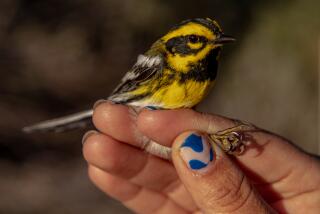Odd, Bent, Roar Are Good Norse Names, But Scott and Russell Are Out : Scandinavia: Surnames, middle names and first names run into myriad rules designed to prevent confusion and preserve culture.
- Share via
OSLO, Norway — Norwegians can name a son Odd, Bent, even Roar, but Scott and Russell are beyond the law.
Danes need middle names to tell each other apart, since half the people share 14 surnames.
In Sweden, middle names are unusual. Swedes are allowed as many first names as they want, however, and some use two last names.
Every baby must be registered, with name officially approved, in the highly regulated societies of Europe’s far north.
Names like Bent Worm, Roar Bull or Odd Ones sound fine to Scandinavians, but the rules bewilder some parents.
Take Becky Carlsson, a 30-year-old American living in Sweden. She has tried for 12 months to get her maiden name, Hincks, approved as a middle name for her 14-month-old son, Samuel.
“They wouldn’t accept Hincks as a second first name, or a middle name,” said Carlsson, who has appealed the case.
Sam could be a Hincks if his mother had continued to use her maiden name; the law says a Hincks and a Carlsson may have a baby named Hincks Carlsson, but two Carlssons cannot. Hincks is forbidden as a first or second name because it is a surname.
“All this regulation started because a lot of names were being casually used,” said Anne Svanevik, a Norwegian name researcher. “Officials were trying to stabilize things so it would be easier to find people in files, for example.”
Scandinavians often adopted the name of a farm or region, which they might change like an address if they moved.
They created new surnames by adding “sen” or “son” to the father’s given name. A Danish Jens, son of Hans, became Jens Hansen. His son Per took the name Jensen, the grandson became Persen, and so on.
Chaos reigned by the mid-1800s and governments insisted that everyone adopt a permanent family name. Iceland is an exception; patronymics persist among the island’s 250,000 people.
New rules brought forth lists of legal last names, reserved family names, surnames available to anyone and acceptable given names.
Each year in Sweden, thousands of Johanssons, Anderssons and Svenssons ask to change their names, which are so common that mix-ups are inevitable. Each must apply to the Patent and Registry Board for permission.
About 20,000 of Norway’s 4.2 million people change family names each year.
“Norway passed a forename law in 1923 because people started to use last names as first names, and to protect children from having names that sounded strange,” Svanevik said.
An 1828 decree inadvertently stripped Danes of a rich variety of informal surnames, leaving 70% with names ending in “sen,” said Gillian Fellows-Jensen of Denmark’s Institute of Names Research.
“The government said everyone had to have a permanent last name,” said Fellows-Jensen, who was allowed by a 1983 reform of the law to hyphenate her name.
“They didn’t mean just the ‘sen’ names. It was up to the local vicar to record names. A lot of vicars weren’t very imaginative and wrote down the easiest one: the patronym.”
Hundreds of Danes now have the same first and last names, creating an identity problem that can follow them to the grave. Tombstones are inscribed “Mr. Managing Director Jensen” and “Mr. Unskilled Worker Jensen” to distinguish the occupants.
In Oslo, a city of 480,000 people, 50 of the 4,000 Hansens in the telephone book are named Hans and hints are provided, like Hans the surveyor, Hans the retired, Hans the bricklayer.
Scott, Russell and some others are registered as surnames in Norway and cannot be used as given names. Immigrants are given leeway, however, and usually can register non-Nordic first names like Hussein or Carlos without problems.
“I know a Norwegian family who wanted to name their baby Scott and were refused, while Scott was approved for another family with one British parent,” Svanevik said.
At the Swedish population registry, Thomas Erikson said: “We respect whatever name people had when they moved to Sweden. Their children born here have to abide by Swedish law.”
Erikson said Carlsson’s difficulty arose because Hincks clearly is a surname.
“If she could show that it was used anywhere as a first name it would probably be all right,” he said.
Carlsson even tried to smuggle the middle name into Sweden.
“We went home” to Hartford, Conn., “and had him baptized Samuel Hincks Carlsson, then we filed to change his name here,” she said.
It didn’t work.
“In the eyes of the Swedish state, he’s still Samuel Carlsson, but God knows he’s Samuel Hincks Carlsson,” said Sam’s father, Mats.
More to Read
Sign up for Essential California
The most important California stories and recommendations in your inbox every morning.
You may occasionally receive promotional content from the Los Angeles Times.













